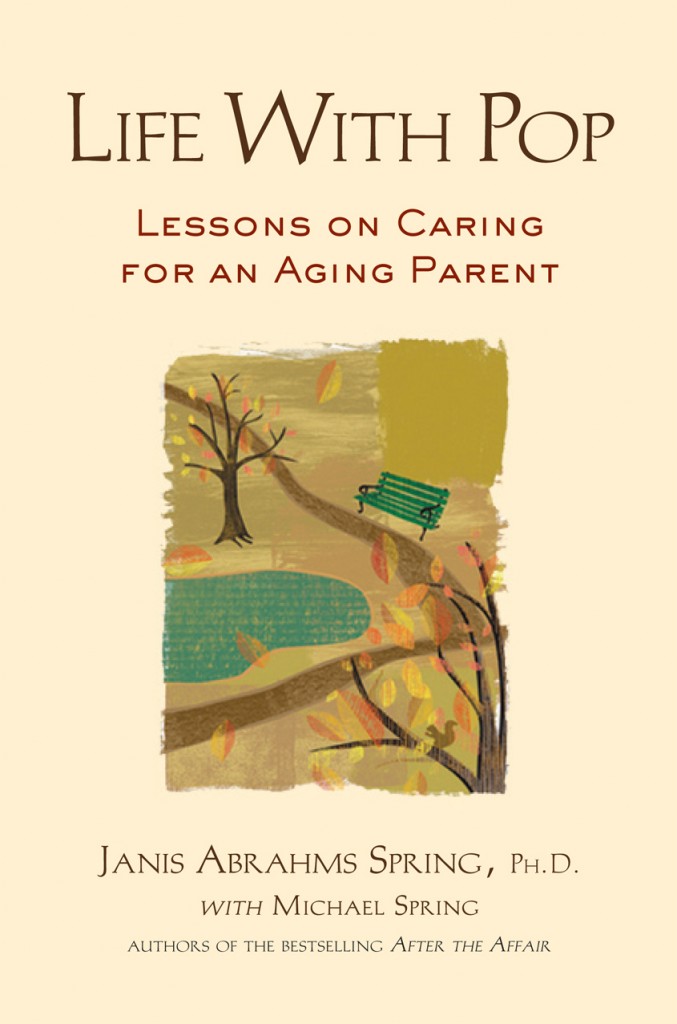An excerpt from the book, Life With Pop: Lessons on Caring for an Aging Parent, by Janis Abrahms Spring, Ph.D., with Michael Spring.
September 29, 2005
I’m at the hospital by nine. My heart is pounding — and breaking.
Dad lies stiffly in bed, unable to lift his head, so I draw my face up close to his and take his hand. We spend a few minutes chitchatting, warming up. He may not be alert for long, so you’d better get into it now.
“Dad,” I say gingerly, “we need to have a serious talk about what’s happening to you.”
He seems to be listening with every nerve in his body. I speak as slowly and gently as I know how, for his sake, and mine. “The reason you got pneumonia is because when you swallow, the food drips into your lungs.”
I look into his eyes to see if he’s registering what I’m saying. He’s with me every step of the way.
“You can’t eat anymore or you’ll get sick. You need a feeding tube. Do you understand?”
Dad licks his parched lips, fumbling for the right words, then responds with perfect clarity, “Yes, I do.”
“Repeat back to me what I’m telling you so I know you understand.”
“I can’t eat by my mouth. I need a feeding tube.”
“That’s right.”
I’m amazed and relieved at his level of functioning. Then he asks, “For how long?”
Oh my. This poor man. He really doesn’t understand how sick he is. How could he? He’s been in and out of hospitals his whole life. Why should he assume this round is any different? How would he know his illness is incurable?
I turn back and look him straight in the face. “Forever, Dad. You’ll need a feeding tube forever. You’ll never eat food again. Maybe a few bites of applesauce or soup, but mostly you’ll eat from a feeding tube.”
I move away from the bed, wiping my eyes, trying to hide the evidence of my aching sadness. This is his decision, Jan. Don’t confuse him with your emotions.
“Does [your brother] Joel know?” Dad asks.
“Yes.”
“What does he say?”
What do I tell him? That Joel said no to any intervention? Is that fair to Joel? Would Dad understand? Would he want to know?
“Joel has mixed feelings about it,” I say, sidestepping the truth.
“Can I think about it for a day?” Dad asks. The innocence of his request chokes me. This is a man who never asks for anything. It is his life we are talking about.
“Of course you can.” I cradle his hand. “It’s a very big decision.”
I have yet to mention the D word. It’s time. I bring it up obliquely. “Do you ever think about dying?”
“All the time.”
I’m shocked. Dad has never discussed death with me before. I reach for words and come up empty-handed. Dad closes his eyes and slips away.
When I return in the afternoon, Dad is no longer capable of a sustained conversation, much less a talk about life and death. The day passes. As he shifts in and out of consciousness, I climb into bed with him. He lies on his back, covered with thin blankets, his head propped up on pillows. An oxygen tube hangs from a nostril. The other remains free to receive sustenance, or not. I snuggle up to this sweet teddy bear of a man and caress his bruised, lumpy arms, swollen from innumerable blood tests and IV fluid.
“Pop,” I whisper, kissing his rough, stubbled cheek, “you’ve always been a man who cries easily, with no shame. I can’t understand why you don’t cry now. Are you at peace with where you are, or lost in a morphine high? It would be so much easier if you would tell me what to do. Please, tell me what you want me to do.”
JANIS ABRAHMS SPRING, PH.D is an award-winning author and board-certified clinical psychologist in private practice for 36 years. Dr. Spring is a recipient of the Connecticut Psychological Association’s Award for Distinguished Contribution to the Practice of Psychology, a former clinical supervisor in the Department of Psychology at Yale University, and a media guest on NPR and television programs like Good Morning America. She and her husband live in Westport, CT. For more information, go to www.janisaspring.com. Copyright 2009.






